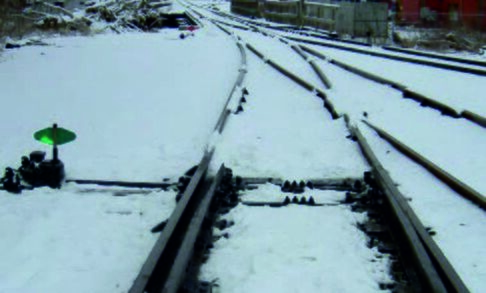Track switches, derailment
Jump to navigation
Jump to search

Track switches, derailment. Snow and wind as a combination are the hardest condition for track switches, which are the moving track parts meant for directing the train to the right track. Wind causes snow to move horizontally, packing it between switches moving part and preventing its movement. Packed snow can prevent switch movement, or lodge it halfway between positions, creating a possible derailment of the train.
References
- ↑ Kloow, L. (2011). High-speed train operation in winter climate. KTH Railway Group Publication 1106.
- ↑ Kloow, L. (2011). High-speed train operation in winter climate. KTH Railway Group Publication 1106.
- ↑ Deuce, R. et al. (2019) Mechanical deterioration of wheels and rails under winter conditions – mechanisms and consequences. Proceedings of the Institution of Mechanical Engineers. Part F, Journal of rail and rapid transit. [Online] 233 (6), 640–648.
- ↑ Ottosson, L. (2019). Analysis of High-Speed Passenger Trains and the Influence of Winter Climate and Atmospheric Icing (Master’s Thesis at Umeå University).
- ↑ Wang, J. et al. (2018). A study of snow accumulating on the bogie and the effects of deflectors on the de-icing performance in the bogie region of a highspeed train. Cold Regions Science and Technology, 148, 121–130.